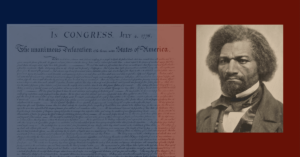
Eisenhower and the Origins of the “Military-Industrial Complex”
Less than a week before he left office, President Eisenhower delivered his final speech to the American public, a speech that would come to be known as his Farewell Address. In the most famous portion of the address, Eisenhower warns against the danger of the “military-industrial complex.” The term so neatly captured an emerging phenomenon that, decades later, historians and popular commentators use it without pointing to its origin. Yet it is worth studying the original context to understand exactly what Eisenhower meant
Until the latest of our world conflicts, the United States had no armaments industry. American makers of plowshares could, with time and as required, make swords as well. But now we can no longer risk emergency improvisation of national defense; we have been compelled to create a permanent armaments industry of vast proportions. Added to this, three and a half million men and women are directly engaged in the defense establishment. We annually spend on military security more than the net income of all United States corporations.
This conjunction of an immense military establishment and a large arms industry is new in the American experience. The total influence-economic, political, even spiritual-is felt in every city, every state house, every office of the Federal government. We recognize the imperative need for this development. Yet we must not fail to comprehend its grave implications. Our toil, resources and livelihood are all involved; so is the very structure of our society.
In the councils of government, we must guard against the acquisition of unwarranted influence, whether sought or unsought, by the military-industrial complex. The potential for the disastrous rise of misplaced power exists and will persist.
For Eisenhower, the danger posed by this new reality was not only the lobbying influence and economic might that arms companies would wield going forward. It was a “total . . . even spiritual” threat to the character of American society. Eisenhower’s private diary, as well as his letters to his friends during his political career, show his persistent concern about the unending militarization of American foreign policy. He viewed military spending as “sterile” and worried it would lead to a society that mistakenly valued safety and arms at the expense of schools, infrastructure, and social safety nets.
Relevance to today’s political environment
The Cold War would not end until more than two decades after Eisenhower left office. Since then, the American military has not demobilized in any significant way. More recently, a conversation about police budgets, equipment, and orientation to their communities has arisen after the killings of George Floyd, Breonna Taylor, and Rayshard Brooks. In Minneapolis, for instance, nine of twelve city council members have pledged to replace their city’s police department with “a reimagined model of public safety.” Beyond Minneapolis, conversations about reducing police budgets are happening in almost every major city in America.
Today, Eisenhower offers Americans a way to think critically about the impacts of huge police budgets and militarized police equipment on American society.
New York City maintains a massive police force, the country’s largest. In 2019, the city spent nearly six billion dollars on its police force, a figure that dwarfed other city public safety agencies. The city’s allocation has also grown by about 30% in the past ten years alone.
These funding increases correlate with increased use of militarized police equipment. One study of the subject found that over 8,000 law enforcement agencies in the United States have used federally funded programs to buy a combination of traditional military equipment, including “machine guns, armored vehicles, bayonets, grenade launchers, and military aircraft.” The same study finds that the use of military tactics by local police has increased 1,400% in the past forty years.
Looking to the Future
If American policymakers took Eisenhower’s warning about the military-industrial complex to heart, they might direct spending on police to more benign ways of training and equipping them. This would not necessarily result in reduced spending on law enforcement (although Eisenhower would likely favor that). Yet it could lead to a new vision for it–and perhaps for all government agencies, be they local, state, or federal. Ideally, these agencies should view their mission as cooperating with American citizens who are trying to peacefully live their lives and pursue their dreams. Eisenhower’s brilliant insight was that a cooperative relationship between government and citizens cannot flourish if spending on military equipment, and the influence of companies who make and sell it, go unchecked.
Eisenhower was no pacifist. He oversaw a huge and growing military during his presidency and he personally conceived of and led the invasion of Normandy. He had no illusions that difficult policy questions might be resolved with easy answers. And yet, as he retired from public service, after eight years as president and nearly 30 years of arguably the most distinguished military career in American history, he advised Americans that they guard against the militarization of their society, lest they face the “total…even spiritual” adverse impact of allowing any armed group power over domestic life.



